- Home
- Gail Godwin
The Making of a Writer, Volume 2
The Making of a Writer, Volume 2 Read online
Also by Gail Godwin
NOVELS
Unfinished Desires (2010)
Queen of the Underworld (2006)
Evenings at Five (2003)
Evensong (1999)
The Good Husband (1994)
Father Melancholy’s Daughter (1991)
A Southern Family (1987)
The Finishing School (1984)
A Mother and Two Daughters (1982)
Violet Clay (1978)
The Odd Woman (1974)
Glass People (1972)
The Perfectionists (1970)
SHORT STORIES
Mr. Bedford and the Muses (1983)
Dream Children (1976)
NONFICTION
The Making of a Writer: Journals, 1961–1963 (2006)
Heart: A Natural History of the Heart-Filled Life (2001)
Copyright © 2011 by Gail Godwin
All rights reserved.
Published in the United States by Random House, an imprint of The Random House Publishing Group. a division of Random House, Inc., New York.
RANDOM HOUSE and colophon are registered trademarks of Random House, Inc.
Grateful acknowledgment is made to Alfred A. Knopf, a division of Random House, Inc., for permission to reprint excerpts from Dream Children by Gail Godwin, copyright © 1976 and copyright renewed 2004 by Gail Godwin. Reprinted by permission of Alfred A. Knopf, a division of Random House, Inc.
LIBRARY OF CONGRESS CATALOGING-IN-PUBLICATION DATA
Godwin, Gail.
The making of a writer : volume two /
Gail Godwin ; edited by Rob Neufeld.
p. cm.
eISBN: 978-0-679-60438-9
1. Godwin, Gail—Diaries. 2. Novelists, American—20th century—Diaries. 3. Fiction—Authorship. I. Neufeld, Rob. II. Title.
PS3557.0315Z468 2006
813’54—dc22 2005044929
www.atrandom.com
Jacket design: Anna Bauer
Jacket photograph: courtesy of the author
v3.1
To
Kathleen Krahenbuhl Godwin Cole
(1912–1989)
Mother / Writer
PREFACE
Our hope from the beginning of this project has been to trace through these early journals the “soon or never” trajectory in the life of an aspiring writer.
“When, when will mine eyes find the light?” Prince Tamino beseeches the priests in The Magic Flute. “Soon, soon, Youth, or never,” comes the ominous choral reply. Which pretty much sums up the tension in Volume 2 of The Making of a Writer: “Am I going to get to do what I want to do more than anything? Or will it be a case of my having wanted what could never be?”
This second and final volume of The Making of a Writer contains entries from journal notebooks dating from July 23, 1963, to July 6, 1969. The journals in Parts 1 through 5 were written in England; those in Parts 6 through 9, in Iowa City, Iowa.
Volume 1 of The Making of a Writer, published in 2006, opened in the summer of 1961, when, at age twenty-four, after two staggering personal and professional failures (one of each), I started over as a waitress in order to earn money to travel abroad and become a writer. Volume 1 broke off in midsummer of 1963, in London, on a note of reassertion and resolve, although with no concrete “proof” of my having yet accomplished anything.
Volume 2 of The Making of a Writer continues in the London of 1963–1965, when I am asking myself whether or not I have overstayed my time in this fascinating city, then suddenly changes gears with a precipitous marriage to an English doctor met in a fiction-writing class. Volume 2 ends in Iowa City, with me as a soon-to-be published novelist.
Apropos of the “soon or never” cusp, I remember a poignant walk I took with my mother on a visit to Asheville, North Carolina, from Iowa City at the end of the summer of 1968. I was thirty-one, twice divorced, and had been a student in the Iowa Writers’ Workshop since the spring of 1967. Now I was working toward a doctorate in literature and supporting myself on a teaching fellowship while yearning (a feeling often closer to despairing) for the day when I would be a “certified” writer, i.e., published. At the end of that summer semester, having passed my Old English exam, I boarded a Greyhound bus and went home to my best friend, my mother, Kathleen. As far back as I remembered, both of us had yearned to be novelists.
I say “be novelists,” as distinct from “write novels,” because, at the time I am speaking of, the day of the walk, we had completed seven novels between us: three each and a shared one, entitled “The Otherwise Virgins.” She wrote the first version, and after shopping it around for several years, bequeathed it to me when I was a junior at Chapel Hill. “I still think it’s a damn good story,” she said. “Take it and see what you can do with it.” I kept the plot and the three women’s points of view, updated the college campus from post–World War II to post–Korean War, added my own quirks and sensibilities—and got off to an inauspicious start by sending it to the same agent who had rejected the first version and remembered the plot and the title. This shared novel, along with our other unpublished novels (including two later ones she wrote), is now in the Southern Historical Collection in the Wilson Library at the University of North Carolina at Chapel Hill. I still think “The Otherwise Virgins” is a damn good story. I wish I had a hungry young writer to whom I could say: “Take it, with my blessing, and see what you can do.”
Now, on this afternoon walk, through neighborhood streets of my mother’s childhood and mine, we were again talking about the elusive and inexhaustible subject of writing.
On the bus trip from Iowa I had read Colin Wilson’s funny, short autobiographical novel Adrift in Soho, which chronicled the apprentice years of some young would-be writers, artists, and anarchists hanging out with one another in post–World War II London. And now Mother was reading it, and on our walk she was telling me all the things she was enjoying.
“And you know what I love most?” she said. “Some of them are so close to what they want to do, and they don’t know how close. But we do.”
Gail Godwin
CONTENTS
Cover
Other Books by This Author
Title Page
Copyright
Dedication
Preface
PART ONE The Dramatic Self
JULY 23, 1963, TO SEPTEMBER 30, 1963
PART TWO Brothers and Lovers
NOVEMBER 17, 1963, TO MARCH 23, 1964
PART THREE Portrait of a Woman
JANUARY 31, 1965, TO MARCH 18, 1965
PART FOUR Accommodating Lucifer
MARCH 20, 1965, TO FEBRUARY 12, 1966
PART FIVE The Outsider
MARCH 21, 1966, TO MAY 22, 1966
PART SIX Getting Published
MARCH 5, 1968, TO NOVEMBER 3, 1968
PART SEVEN The Void and the Validation
NOVEMBER 3, 1968, TO DECEMBER 11, 1968
PART EIGHT The Writer’s Contract
DECEMBER 13, 1968, TO MARCH 11, 1969
PART NINE Completion
MARCH 12, 1969, TO JULY 6, 1969
Afterword
Acknowledgments
About the Author
Part one
THE DRAMATIC SELF
London
JULY 23, 1963, TO SEPTEMBER 30, 1963
In the summer of 1961, twenty-four-year-old Gail Godwin dispatched herself to Europe to become a writer. Having shed both a marriage and a journalism career, she hung her financial well-being on the promise of a job with a soon-to-open U.S. Travel Service office in London.
For two years, Gail negotiated foreign cultures and demanding relationships while hungrily educating herself and recording h
er emotional and intellectual progress. The first volume of Gail’s journals (published in 2006) revealed how she’d found her voice and purpose, distinguishing herself from her influences. The second volume now shows how she built on that self-confidence to publish her first stories and novels.
Fittingly, Volume 2 opens with Gail parked at her desk in her familiar Chelsea boardinghouse, reading her previous journals. “I have only to reread them to pick out the inconsistencies and to recognize the few true aspirations that thread through page after page,” she writes.
Using herself as a laboratory of introspection, and her relationships as opportunities to understand others, Gail follows the model of one of her heroes, Carl Jung, whose Memories, Dreams, Reflections recorded his inward explorations. What Gail comes up with is distinctive, and is encapsulated in the title of this journal part, “The Dramatic Self.”
The dramatic self is, in one sense, the posing self, the one that is on stage in society. In another sense, it is the self that experiences the most essential dramas—meaningful interactions based on one’s natural agenda. Finally, there’s the dramatic self that is separate from the person and belongs in the world of literature, the one that is re-formed to sound true in stories.
Reading about Gail’s adventures and misadventures shows how her literary sphere of existence was as prominent as her social one. While her coworkers, fellow tenants, and boyfriends provide community, they stand in opposition to her aloneness and imagination.
Through it all, the psychology, politics, and nuances of male-female relations preoccupy Gail. Although any subject would do for a writer striving to develop her art, gender relations were particularly pertinent at the time. Gail was in the thick of the matter. “I want to … exploit, define, name, place this ever-shifting contest between men and women,” she wrote on August 13.
The dilemma for Gail was how to have her enlightened perspective correspond to happiness in personal relationships, in which egos often foiled idealism. On August 13, Gail wrote that she wanted to convey, among other things, “the feeling you get while living through a happy moment—when you refer back to the past when you had anticipated this moment, and when you look toward the future when you won’t have it any longer.” She wanted anticipation and reflection to be part of the moment—yearning, experience, and loss, all one.
JULY 23, 1963
More and more I believe in these journals. They are my “thinking out” grounds where I can record and measure my deviations. I have only to reread them to pick out the inconsistencies and to recognize the few true aspirations that thread through page after page. It is difficult to label oneself “faithful” when, upon rereading two years’ worth of self-reflection, one finds agonizings over B., Niels, Antonio, James, Jim Jensen, Henry, and Gordon! On the credit side, I know for certain that this urge to understand/write is no fly-by-night whim. I know how Gordon feels when people say: “Oh, Bisley! Yes, I’m a pretty good marksman myself. I’ll have to come out with you one Sunday and shoot a few bull’s-eyes!”1 I feel the same impatience with people who say: “Oh, yes, writing. I’d like to write if I only had the time. My life would make one hell of a story.”
Pat Farmer wrote her après-honeymoon letter to Doreen2 “and everybody” from Mexico City. She obligingly described the wedding—sending clippings—and the honeymoon, showing a color photo of herself among Mayan ruins. Mr. Miller couldn’t wait to read the letter. He always liked her. “Well! Is that from you-know-who? She finally made it. See, there’s hope for you girls yet!” Pat wrote about how she and Pepe went skin diving and horseback riding. Then she put in the paragraph about how happy they were, adding that it was somewhat of an adjustment, etc., etc., but that it was surprising how much you could get out of a situation where you worked very hard to make the other person happy, etc., etc. She then mentioned that she was trying to get a job with USTS-Mexico. Doreen read the letter and then expounded upon how ecstatic Pat must be.
After Doreen left, Dorothea3 observed: “I think it’s interesting that she wants to work again.” Then we both exchanged knowing looks, and she said: “My God, by the time we’re thirty-five we’re going to be goddam sages.” So the balance is restored in the office, or should I simply say the dialectic has swung? Dorothea admits taking refuge from the realization of a bad marriage through hard labor. “By the time I’ve prepared a meal and cleaned the house and washed up and ironed, I don’t have time to think about myself. I’m too tired. Of course I realize that there might be a lifetime of this.”
After spending the better part of the past three days with Gordon on the shooting range at Bisley, sailing in Henley4 drinking in various pubs, and then last night at the horse show, I have come to the conclusion that I still love him, but in a modified way. I think I will value him for the efforts I am making to win him! We passed two people in the White City Stadium5 and he said: “Were those men or women?” I said, sort of off the cuff: “Why, the one that looks like a man is a woman; the one that looks like a woman is a man.” “What makes you say that?” he asked. “Well, you should always know that things are the opposite of what they appear.” (Canting unforgivably!) “Smart girl.” Did he really think so? I also learned about his experiences on the convoy going to the U.S. during the war. He said he even made himself a survival kit. There was something in this story about the calm, almost detached way he went about things. I saw the war from a little boy’s eyes. And the way he’d watch the laggers-behind get sunk by the German U-boats. All this—the years in Canada and Trinidad—shaped him, too. But I think he was born with this dogged, plodding, stubborn way of doing things.
But, today in Gill’s bookstore, several incidents combined and made me see the kind of man that is possible: I saw a book I wanted, [the latest volume of] Simone de Beauvoir’s autobiography,6 about her writing and her life with Jean-Paul Sartre. And I thought, Wouldn’t it be nice if someone knew me so well they would know this is the book I want and bring it home? I know that I am capable of such consideration toward someone else. Then I thought of the possibility of, say, Gordon bringing me that book. It was impossible. (1) He doesn’t go into bookstores. (2) He doesn’t know who Simone de Beauvoir is. (3) He doesn’t know what I read, in spite of the fact he’s always inspecting book titles. Somehow I remember Doug7 and me in the bookstore in Detroit one evening while we were killing time before seeing Spartacus. I was in heaven—thousands and thousands of glossy new books, two floors of them, and some strange new symphony playing. I asked Doug if he would buy me Jacob’s Room & The Waves by Virginia Woolf, a $1.75 paperback, and he grudgingly assented. The music grew on me. I went up to the man at the desk and asked him what it was. “Oh, that’s Beethoven’s Pastoral, I think,” he said. And when we were back in Florida I bought it and began playing it more and more to assert my aesthetic independence from Doug.
JULY 27–28 • After midnight
I read an article by Marya Mannes8 today. I’m one of those women whose composition is balanced peculiarly between woman-ness and creativity.
JULY 30
Dorothea: “I think I attribute that sick feeling I have every morning to the leftover anxiety from unremembered dreams.”
AUGUST 7
It is with immense relief that I close the door to my room on the top floor of a Chelsea house,9 settle into a comfortable bed, and listen to the sounds of the night, the muffled hum of traffic down by the embankment, the toned-down rock and roll of a German radio program (bringing back the night in the East Berlin police station, fall 1961).10 True, time is the villain and we are trapped in him. True, love is sometimes not returned. True, friends are sometimes false. But to be aware of this—all of it—and still want to go on living, that is the triumph. It is the reward. Go on, French voices; and there is Rachmaninoff in the background. Thomas Wolfe called loneliness a brother and I think he was right. And I have not read Rimbaud or Baudelaire nor have I even begun to put down what I will put down on paper.
But first, the bad dream and then
the realizations that came unexpectedly out of a weekend that, from all outward signs and from everybody else’s viewpoint, was pleasant, restful, and full of good fun.
This morning, the alarm awoke me at eight. Then I dozed and dreamed that I was standing in some sort of a gymnasium watching some performance or other. Gordon came in with John11 and Sally Milner, the very attractive, upper-class English girl who works at USTS. He said to me, “Oh, hello, nice to see you,” in that cordial way he has. Then he transferred his entire attention to the performance on the stage. I kept watching him for some assurance that we had meant something to each other. Finally I asked him, “Gordon, aren’t we going camping together?” And he answered very surely, very unembarassedly, with the same detachment that he used the day Bobbie12 and I turned up at the same time in his flat when he was sick, “No, I’m afraid I can’t. I’m taking Sally.” Then I turned to Sally and said, “But how? You’ve just come back from three weeks’ vacation.” She replied, “Yes, but you see, in this life, some people get three weeks’ vacation and some don’t get any at all. And usually the people who get three get offered more.” So I took my sweater and handbag and said, “Well, in that case, I’ll be leaving.” I walked out of the gymnasium, feeling Gordon’s eyes on me, thinking: He’ll be sorry. Then I got outside and thought: It hurts as much as it possibly can—ever. Then I turned around and went back in and caused a scene. Gordon remained smiling and unperturbed. I said: “I’m just in the same category with Bobbie.” He answered: “That’s okay. I like having her around once a week or so.”
I awoke feeling beaten. I lay at the foot of my bed, saying “Oh, no!” Then I got up and went to the washbasin to wash away any visible traces of the ordeal I’d just been through. I looked surprisingly normal to myself in the mirror. I thought: It cannot get any worse. Then, and this is very important, I was overcome by an almost beautiful kind of relief: I recognized my plight and accepted it, knowing that I was going to live it out—like you wear out a pair of shoes or write out a journal. There was a basic sense of continuation of life, a celebration of change.

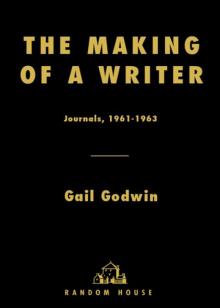 The Making of a Writer
The Making of a Writer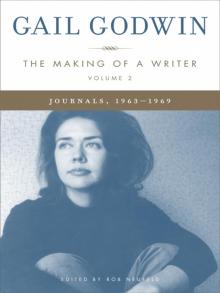 The Making of a Writer, Volume 2
The Making of a Writer, Volume 2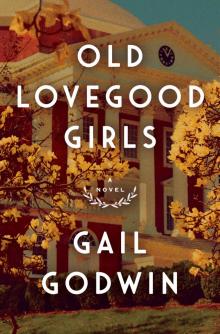 Old Lovegood Girls
Old Lovegood Girls Flora
Flora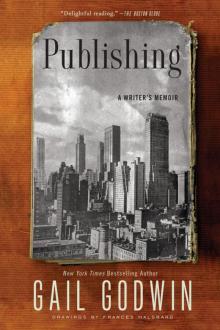 Publishing
Publishing The Finishing School
The Finishing School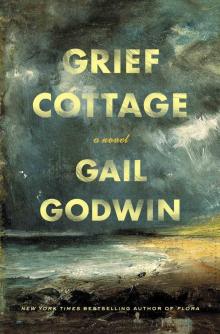 Grief Cottage
Grief Cottage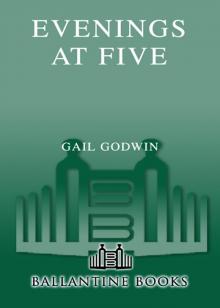 Evenings at Five
Evenings at Five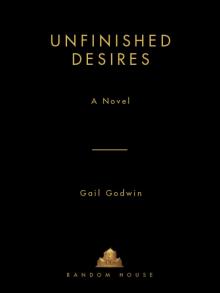 Unfinished Desires
Unfinished Desires